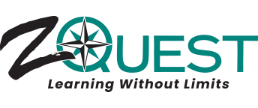About Us
What is PBL?
What is PBL?
Project-based Learning (PBL) is a way of teaching and learning that frames the required content in a real-world problem, or driving question, as we say in PBL lingo.
In order to solve this problem, students are guided through lessons and learning experiences that marry the content to the driving question in a way that gives students an open-ended way to make meaning. Students synthesize this learning and work with their groups to create a solution which is then presented to an authentic audience (ie. not just the teacher!)
PBL is...
|
PBL is not...
|
What is a balanced calendar?
ZQuest operates on a balanced calendar, meaning we spread out our learning sessions while taking advantage of break weeks throughout the year! We typically structure our year to have ~6-week blocks of instruction, followed by a week-long break. Students at ZQuest have all the same breaks as the traditional ZPS calendar except ZQuest has ~7 weeks off in the summer and starts ~two weeks before and two weeks after the traditional calendar. We have the same number of school days the traditional calendar, just distributed differently.
During the summer months of June and August when only ZQuest is in session, students attend school M-Th (no Friday's), from 8:30 am-2:00 pm. Usually this breaks down to 8 days before and 8 days after the traditional calendar.
When all traditional ZPS schools are in session, we operate during the regular elementary and middle school times (8:40-3:35 for elementary and 7:35-2:30 for middle school).
What is multi-age learning?
At Zeeland Quest, we strive to not limit our students based on grade level. Rather, we look at students as whole children and teach to the individual--regardless of their grade level. Students learn collaboration, responsibility, communication, and independence as they work with their peers. Teachers use a variety of differentiated teaching and learning methods to reach the unique needs of each child. When you step into one of our classrooms, you may not even realize that there is more than one grade level represented!

